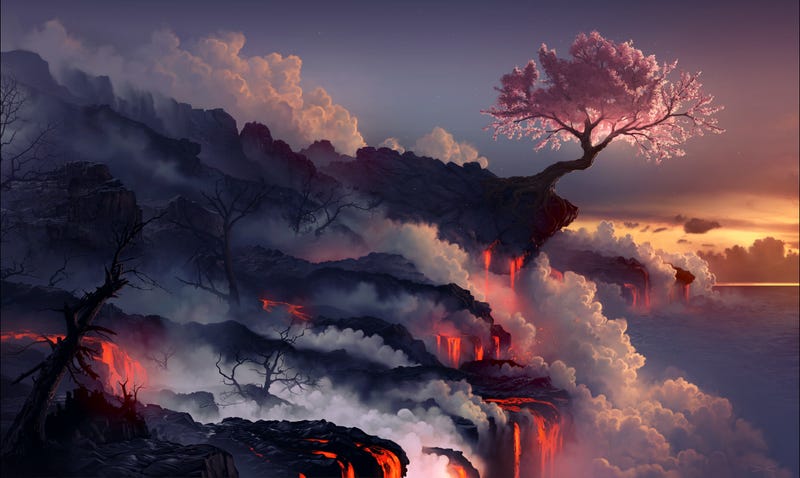The author of the essay below outlines scenarios for the end of the world, but settles for a hopeful scenario. A starter for conversation on other perceptions...
http://www.scienceandfantasyfiction.com ... -world.htm
The End of the World
by Scot Noel
Boom. The end of days. How will it happen, when everything we know dissolves at last into chaos and death?
The possibilities, while not endless, are certainly robust. Nuclear annihilation is still near the top of the list. Plague is an oldie, but a goodie, especially as our population is expected to top 9 billion planet wide by the middle of this century (it was less than 800 million in the year Johann Sebastian Bach died of a stroke, leaving The Art of the Fugue forever unfinished).
I personally find the possibility of a "rapture" like event, including the return of God (any god for that matter) the most unlikely doomsday event of all. I happen to have a long and abiding interest in matters religious, and the end times as a physical interference in the cosmological order -- well, neither you nor the next quaquicentennial generation is going to live to see that one.
More likely possibilities include asteroid collision, runaway nano-technology, and a man-made black hole coming loose from the Large Hadron Collider at CERN in Switzerland. Regardless of global warming an ice age may yet bury us beneath miles of snow, and we could always end up just poisoning ourselves, either to death or to sterility.
But of one fate I'm reasonably certain. Sometime toward the end of the next 5 billion years, the sun will run out of abundant hydrogen for fuel and begin to expand into a red giant. Earth, which in comparison is little more than a wet grain of sand, will be absorbed into the unfolding of this colorful nebula, regardless of any native protests or prayers. On that day, neither the sun nor the vast Milky Way beyond will give reprieve for the absolute and final extinction of all earthly life.
When the surface of the sun does come this way, will anything resembling Man still be around? I think not. But just like doomsday itself, the possibilities are many. No species lives for 5 billion years. One consideration is that we are in the process of designing our own successors, and have been since early man learned to smelt ore. Don't be fooled by what robots and computers are capable of today, any more than by scoffing at the first copper sword you might have forestalled the eventual development of the thermonuclear bomb.
Intelligent, rational, even emotional machines will come. Whether it is tomorrow or five thousand years from now, the long march toward that eventuality is a matter of time, not physics. Our brains do it, and they exist in the real world. The rest is just problem solving. And so Man will diminish and pass on into the west, and what our in-organic progeny will think of us is a story yet to be written.
As a side show of history, we may yet spread across the solar system, and perhaps even to the stars. That will stretch the ability of any one catastrophe to get us all. But even then, after a hundred thousand years, will the ore miners of Mercury and the cloud minders of Jupiter think of themselves as one and the same? Will they be children of the same God, or will their thoughts and perceptions so separate them that even fox and rabbit think more kindly of themselves as kin?
Time is on our side
One way or another, the world will end, and humanity too. It's a question of time and circumstance, but the outcome is inevitable if not close at hand. World's have lifetimes, and so do species. In the natural course of things, even stars are born, age, and die.
If we are ill-equipped to understand any aspect of that truth, it is the nature of time. The age of Man, be it a million or a billion years in duration, is nevertheless but a single tick on a clock that knows no end. Nuclear war may come, but not today. The asteroids will surely come, but not tomorrow, or even the day after. Our progeny will scrape by and survive, rise and fall a hundred times. Only to do it over again as if they were the first.
Mesopotamia and ancient Egypt, Imperial China and Rome, the Aegean and Phoenician civilizations: we and our remote descendants are one with them in this singular moment of time. It's all been an afternoon, no more. The sun's been fair, the weather clear, and our problems mainly of our own making. From the biggest volcano to the Biblical flood, we haven't seen anything yet. Not doomsday. Not even close.
And it's not likely that we will.
The Doomsday Clock of the Bulletin of the Atomic Scientists is at 5 minutes to midnight as I write this, but my own (sometimes arrogant) optimism tells me that Man is closer to the beginning than to the end of his days. The first fair day of history will be followed by another, and yet another before the weather begins to turn. And 20,000 years from now, who knows where we will be?
If I could see that day, so short a time and yet so far, I'm sure there would be this: an immortal sitting somewhere, waiting for doomsday, and doomsday not yet ready to come.

